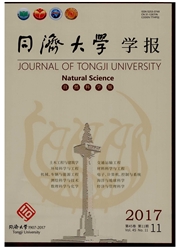

 中文摘要:
中文摘要:
以冻结温度和融土初始固结度为影响因素,通过室内动三轴试验对地铁循环荷载作用下冻融软土的孔压发展规律进行研究.结合试验数据,建立了考虑冻结温度和融土初始固结度的影响因素的冻融土动孔压累积试验模型.研究表明,冻融作用改变土体内部颗粒联结形式和孔隙结构,导致在循环荷载作用下冻融土动孔压累积速率加快;冻结温度越低,冻融土孔压发展速率越快,且在振动后期的稳定孔压值越高;冻融土初始固结度对孔压发展有影响,初始固结度越高,孔压发展越缓慢,且稳定值越低;低温冻结和低初始固结度的耦合作用加剧了冻融土孔压的累积,使其结构进一步软化.
 英文摘要:
英文摘要:
In this paper, the dynamic properties of frozen- thawed soil under metro loading were studied by dynamic triaxial test, and then obtained the development law of dynamic pore pressure. According to experimental data, this paper established a model of dynamic pore pressure which considers the freezing temperature and the initial consolidation. The study shows that: the freeze-thaw circulation could change the internal particle connection and pore structure of soil. Because of that, the dynamic pore water pressure accumulation rate of the frozen-thawed soil became faster under cyclic loading. And the lower the freezing temperature, the faster the pore pressure develops and the higher the stable pore pressure after vibrated. The impact of initial consolidation of thawing soil on the pore pressure development should be considered at the same time. The higher the initial consolidation, the slower the development of pore water pressure and the lower the stable pore pressure. The coupling effect of low temperature and low initial consolidation degree exacerbated the accumulation of pore pressure of frozen-thawed soil so that further soften the structure of soil.
 同期刊论文项目
同期刊论文项目
 同项目期刊论文
同项目期刊论文
 期刊信息
期刊信息
